Neurotransmitters and Motivation: Supplements That Support Drive and Focus
Introduction
Motivation is one of the most powerful forces in human behavior—and one of the most misunderstood. We often think of it as a matter of willpower or discipline, but the truth runs deeper. Motivation is largely biochemical. It’s the result of a precise orchestration of neurotransmitters—the brain’s chemical messengers that regulate energy, focus, pleasure, and drive.
When these neurotransmitters are in balance, you feel inspired, focused, and capable of taking consistent action. But when they’re depleted or misfiring, motivation dries up. Even simple tasks can feel impossible.
The good news is that neuroscience and nutrition offer ways to support these brain chemicals naturally. With the right diet, lifestyle habits, and targeted supplements, you can restore mental energy, sharpen focus, and reignite your inner drive.
This 3,000-word guide explores:
The key neurotransmitters behind motivation
How imbalances lead to procrastination and fatigue
Natural supplements that help restore balance and focus
Daily habits that reinforce healthy brain chemistry
Looking for supplements for This? Click here.
The Biochemistry of Motivation 🧬
At the core of motivation are a few essential neurotransmitters:
Dopamine: The "go" signal — drives desire, anticipation, and reward.
Norepinephrine: The "alertness" signal — fuels focus and mental energy.
Acetylcholine: The "learning" signal — supports clarity and sustained attention.
Serotonin: The "contentment" signal — balances mood and reduces anxiety.
Together, these form the motivation network of your brain. When they’re functioning optimally, you feel focused, purposeful, and engaged with life. When they’re depleted, you feel distracted, aimless, or trapped in mental fog.
Let’s explore each one in more depth.
Dopamine: The Reward and Drive Chemical 🎯
Dopamine is the neurotransmitter most closely linked with motivation. It fuels the feeling of anticipation — that rush you feel when you’re about to achieve something meaningful.
Healthy dopamine levels help you:
Feel excited about goals
Persist through challenges
Experience satisfaction when you complete tasks
When dopamine is too low, everything feels like a chore. You might feel apathetic, unfocused, or emotionally flat.
Common Causes of Low Dopamine:
Chronic stress and high cortisol
Sleep deprivation
Poor nutrition (low protein, iron, or B vitamins)
Excessive stimulation (social media, gaming, caffeine)
Overstimulation floods the brain with dopamine bursts, desensitizing receptors over time. This means your brain needs more stimulation to feel motivated—and regular tasks no longer provide a spark.
Supplements That Support Dopamine 🌿

L-Tyrosine
L-Tyrosine is an amino acid that serves as a precursor to dopamine and norepinephrine. Supplementing with it helps your brain rebuild its dopamine reserves, especially under stress.
Benefits:
Boosts mental focus and alertness
Reduces stress-related fatigue
Enhances motivation and cognitive endurance
Dosage: 500–1,500 mg before mentally demanding tasks.
Best stacked with: B6, B9, and B12 — cofactors that help convert tyrosine into dopamine.
Looking for supplements for This? Click here.
Mucuna Pruriens (L-DOPA)
This adaptogenic plant naturally contains L-DOPA, the direct precursor to dopamine.
Benefits:
Elevates mood and motivation
Improves focus and drive
Supports libido and energy
Dosage: 200–500 mg standardized extract (15% L-DOPA).
⚠️ Caution: Avoid long-term use without breaks, as excess L-DOPA can desensitize dopamine receptors.
Rhodiola Rosea
This adaptogen doesn’t just regulate stress—it also enhances dopamine receptor sensitivity.
Benefits:
Increases motivation and resilience under stress
Reduces mental fatigue
Improves mood and cognitive flexibility
Dosage: 200–400 mg daily.
Omega-3 Fatty Acids (EPA/DHA)
Omega-3s improve dopamine receptor density, making the brain more responsive to reward signals.
Benefits:
Supports focus and mood balance
Enhances motivation
Reduces impulsivity and brain inflammation
Dosage: 1,000–2,000 mg combined EPA/DHA daily.
Norepinephrine: The Focus and Energy Chemical ⚡
If dopamine is the “wanting” chemical, norepinephrine is the “doing” chemical. It sharpens focus, heightens alertness, and helps you act on your intentions.
Norepinephrine is synthesized from dopamine, so the two are tightly connected. It’s released when you need to concentrate, overcome stress, or perform under pressure.
When levels are balanced, you feel alert and productive. Too low, and you feel mentally sluggish. Too high, and you feel anxious or restless.
Signs of Low Norepinephrine:
Poor focus or attention
Low physical and mental energy
Difficulty staying awake or alert
Lack of drive under pressure
Supplements That Support Norepinephrine 🌿
Acetyl-L-Carnitine (ALCAR)
ALCAR supports norepinephrine synthesis and mitochondrial energy production.
Benefits:
Improves focus and endurance
Enhances alertness and reaction time
Reduces brain fog and fatigue
Dosage: 500–1,000 mg in the morning.
Ginseng (Panax or Siberian)
Ginseng acts as a gentle stimulant, improving norepinephrine efficiency and reducing fatigue.
Benefits:
Enhances energy and motivation
Reduces mental fatigue
Supports immune resilience
Dosage: 200–400 mg daily.
Looking for supplements for This? Click here.
Green Tea Extract (Caffeine + L-Theanine)
Caffeine increases norepinephrine and dopamine release, while L-Theanine smooths the overstimulation.
Benefits:
Promotes calm alertness
Improves attention and performance
Reduces jitteriness
Dosage: 100 mg caffeine + 200 mg L-theanine for best synergy.
Acetylcholine: The Clarity and Learning Molecule 💡
Acetylcholine is crucial for focus, memory, and learning. It helps you sustain attention and connect new information.
When acetylcholine levels drop, you may experience “mental static”—difficulty concentrating, forgetfulness, or slow recall.
Signs of Low Acetylcholine:
Poor memory retention
Difficulty learning or multitasking
Mental fatigue or confusion
Slow reaction time
Supplements That Support Acetylcholine 🧩
Alpha-GPC or CDP-Choline (Citicoline)
Both are highly bioavailable choline sources that cross the blood-brain barrier.
Benefits:
Enhances focus and mental clarity
Supports learning and memory
Combines well with ALCAR for energy and cognition
Dosage: 300–600 mg daily.
Acetyl-L-Carnitine (ALCAR)
Besides supporting energy, ALCAR boosts acetylcholine synthesis and receptor sensitivity.
Benefits:
Improves mental stamina
Enhances neural signaling
Supports long-term brain health
Dosage: 500–1,000 mg daily.
Bacopa Monnieri
An Ayurvedic herb shown to improve acetylcholine regulation and neuroplasticity.
Benefits:
Enhances memory and learning
Reduces anxiety and mental fatigue
Supports focus under pressure
Dosage: 300–600 mg daily (standardized to 50% bacosides).
Serotonin: The Mood Stabilizer 🌙
Serotonin doesn’t directly drive motivation, but it provides emotional stability. When serotonin is low, stress and anxiety rise, making it difficult to stay consistent or optimistic.
Balanced serotonin helps you feel content while pursuing goals instead of constantly chasing stimulation.
Signs of Low Serotonin:
Irritability or mood swings
Anxiety and overthinking
Sleep disturbances
Cravings for sugar or carbs
Supplements That Support Serotonin 🌿
5-HTP (5-Hydroxytryptophan)
5-HTP is a direct precursor to serotonin. It’s especially useful for improving mood, sleep, and resilience.
Benefits:
Reduces stress and anxiety
Improves sleep quality
Balances mood and motivation
Dosage: 100–200 mg in the evening.
Magnesium Glycinate or Threonate
Magnesium supports serotonin receptor sensitivity and calms the nervous system.
Benefits:
Promotes relaxation
Supports neurotransmitter balance
Improves focus by reducing stress
Dosage: 200–400 mg daily.
Vitamin B6 (Pyridoxine)
B6 is required for converting tryptophan to serotonin. Deficiency can lead to irritability and fatigue.
Dosage: 10–25 mg daily (or as part of a B-complex).
The Dopamine–Cortisol Balance: Motivation vs. Stress ⚖️
Stress hormones like cortisol can suppress dopamine and serotonin. This means that chronic stress literally drains your motivation.
When cortisol rises:
Dopamine drops → less reward anticipation
Serotonin drops → more anxiety
Norepinephrine spikes → mental restlessness
This imbalance explains why burnout often feels like both exhaustion and agitation at the same time.
To rebalance dopamine and cortisol:
Use adaptogens like Ashwagandha or Rhodiola.
Practice deep breathing or mindfulness daily.
Prioritize recovery (sleep, nutrition, hydration).
Balanced stress equals consistent drive.
Nutrients That Support All Neurotransmitters 🌾
Certain vitamins and minerals are universal cofactors in neurotransmitter production.
B-Complex Vitamins
Essential for synthesizing dopamine, serotonin, and acetylcholine.
B6, B9, and B12 are especially crucial.
Dosage: 1 high-quality B-complex daily.
Magnesium
Required for over 300 enzymatic reactions — including neurotransmitter synthesis.
Dosage: 200–400 mg daily.
Zinc
Supports dopamine function and synaptic plasticity.
Dosage: 10–25 mg daily.
Iron
Helps convert tyrosine into dopamine. Low iron = low motivation.
Dosage: Based on ferritin blood tests; consult your doctor before supplementing.
Lifestyle Habits That Enhance Neurotransmitter Balance 🌞
Supplements are most effective when paired with habits that naturally support neurotransmission.
Sleep
Neurotransmitters replenish overnight. Chronic sleep deprivation causes dopamine and serotonin depletion.
Tip: Sleep 7–9 hours, keep bedtime consistent, and limit blue light exposure before bed.
Exercise
Physical activity increases dopamine and serotonin while lowering cortisol.
Tip: Even brisk walking or dancing boosts mood and focus.
Sunlight Exposure
Morning light regulates serotonin and dopamine cycles.
Tip: Get 15–20 minutes of sunlight within an hour of waking.
Mindfulness & Breathwork
Meditation strengthens the prefrontal cortex—the brain region that manages dopamine reward circuits.
Tip: Try 10 minutes of deep breathing or guided meditation daily.
Want to try Breathwork? Click Here.
Balanced Nutrition
Eat whole foods rich in amino acids, vitamins, and minerals:
Protein: eggs, fish, chicken, tofu
Healthy fats: olive oil, avocado, nuts
Complex carbs: quinoa, oats, sweet potatoes
Antioxidants: berries, greens, dark chocolate
Avoid refined sugar and ultra-processed foods that cause dopamine crashes.
Sample Stack for Drive and Focus 🔋
Here’s an example of a neurotransmitter-supportive stack for motivation and clarity:
Morning:
L-Tyrosine (1,000 mg)
Alpha-GPC (300 mg)
Rhodiola Rosea (300 mg)
Omega-3 (1,000 mg EPA/DHA)
B-Complex
Afternoon (optional):
ALCAR (500 mg)
Green Tea Extract (Caffeine + L-Theanine)
Evening:
Magnesium Glycinate (300 mg)
5-HTP (100 mg)
This combination supports dopamine, acetylcholine, and serotonin while keeping cortisol under control.
The Big Picture: Motivation as Balance 🌿
Motivation isn’t a force you summon—it’s a state your brain creates when your chemistry is aligned.
Dopamine gives you desire.
Norepinephrine gives you energy.
Acetylcholine gives you focus.
Serotonin gives you calm persistence.
When these systems are nourished, you don’t have to fight procrastination—action flows naturally.
The key is not to overstimulate with quick fixes (like caffeine or dopamine-chasing habits), but to build long-term neurotransmitter balance through consistent habits and targeted nutrients.
Final Thoughts 🌱
Your motivation is not broken—it’s biochemical. If you feel stuck, scattered, or unmotivated, it’s not a character flaw; it’s your brain asking for support.
By understanding how neurotransmitters fuel your drive, you can take control of your biology and rebuild your natural momentum.
With time, balance, and the right supplementation, you can feel your spark return—one clear, focused step at a time. 💛
Looking for online therapy ? Click Here.
References 📚
Salamone, J. D., & Correa, M. (2012). The mysterious motivational functions of mesolimbic dopamine. Neuron.
Volkow, N. D., et al. (2011). Dopamine and the brain’s reward circuitry in motivation and addiction. American Journal of Psychiatry.
Benton, D., & Donohoe, R. (1999). The influence of nutrients on mental performance. Brain Research Bulletin.
Panossian, A., & Wikman, G. (2010). Adaptogens in stress and fatigue: regulation of homeostasis through mechanisms of action. Phytomedicine.
Wurtman, R. J., & Cansev, M. (2011). Nutritional support for neurotransmitter synthesis and mental performance. Nature Reviews Neuroscience.
Kennedy, D. O. (2016). Cognitive function, brain energy, and nutritional influences. Nutrition Reviews.
Arnsten, A. F. T. (2009). Stress signaling pathways that impair prefrontal cortex function. Nature Reviews Neuroscience.
Peirson, S. N., & Foster, R. G. (2014). Sleep and dopamine regulation in cognition and emotion. Trends in Neurosciences.
Stough, C., et al. (2001). Ginkgo biloba extract improves memory and focus. Psychopharmacology.
Panahi, Y., et al. (2016). The effects of omega-3 fatty acids on neurotransmission and mood. Nutritional Neuroscience.
Related Posts
-

Why Co-Dependency Feels Draining: Adrenal Fatigue and Supplements That Help
The adrenal glands are small but powerful organs that sit above your kidneys, acting as your body’s built-in stress managers. They produce hormones like cortisol and adrenaline that help regulate energy, mood, and resilience. When they’re overworked from chronic stress or emotional exhaustion, fatigue and imbalance follow. Supporting adrenal health naturally can help restore calm, energy, and hormonal balance. 🌿⚡
-

The Link Between Anxiety, Co-Dependency, and Natural Support
Anxiety feels like living in constant alert mode—your heart races, your thoughts loop, and your body can’t find peace. It’s the nervous system’s way of preparing for danger, even when none exists. Understanding what’s happening in your mind and body is the first step toward calming the storm and restoring balance. 🌿💫
-

Supplements That Support Dopamine and Serotonin in Co-Dependent Patterns
Serotonin is the neurotransmitter of calm, confidence, and contentment. When it’s balanced, you feel peaceful and emotionally grounded. When it’s low, anxiety, mood swings, and emotional dependence take over. By understanding serotonin’s role in emotional health—and how to support it naturally—you can rebuild inner stability, improve relationships, and cultivate lasting happiness from within. 🌞💫
-

How Emotional Exhaustion in Codependency Impacts the Nervous System
The nervous system is the body’s communication network, connecting the brain to every organ and muscle. It regulates stress, mood, and emotion through a delicate balance of electrical and chemical signals. When overwhelmed, it can become dysregulated—leading to fatigue, anxiety, and emotional imbalance. Understanding how to calm and strengthen the nervous system is key to healing from chronic stress and emotional burnout. ⚡🌿
-

What Is Co-Dependency? The Role of Brain Chemistry and Stress
Stress is more than a feeling—it’s a full-body experience that begins in the brain and ripples through every cell. When cortisol surges and the nervous system stays on alert, your body can’t rest or recover. Over time, this constant tension affects energy, focus, mood, and even immune health. Understanding stress chemistry is the first step toward breaking free from burnout and finding calm again. 🌿
-

Creating a Supplement Stack for Motivation, Energy, and Anti-Procrastination
Motivation is the fuel behind every meaningful achievement—but it’s not just about willpower. It’s a mix of mindset, brain chemistry, and momentum. When energy, focus, and purpose align, action feels natural instead of forced. Learn how to harness motivation as a daily state, not a fleeting feeling.
-

Supplements for Building Consistency and Reducing Chronic Procrastination
Biochemistry is the bridge between biology and chemistry—the science of life at the molecular level. It explains how nutrients, hormones, and neurotransmitters interact to create energy, thought, and emotion. From brain function to muscle movement, biochemistry reveals the invisible processes that sustain health, balance, and vitality.
-

GABA and Procrastination: Supporting Calm Focus for Productivity
GABA is the brain’s natural calming messenger—a neurotransmitter that helps slow mental overactivity and ease stress. When GABA levels drop, focus fades, anxiety rises, and procrastination becomes more likely. By supporting GABA through nutrition, lifestyle, and supplements, you can restore calm clarity, improve focus, and take action with steady, balanced energy.
-

Ashwagandha and Procrastination: Lowering Stress to Improve Action
Science is the language of curiosity and discovery. It helps us understand the hidden patterns behind life, energy, and the universe. Through experimentation and critical thinking, science connects imagination to evidence—turning questions into knowledge. Whether through microscopes, molecules, or minds at work, science represents our endless pursuit of truth and innovation.
-

How Stress Hormones Like Cortisol Fuel Procrastination (and What Helps)
Blood sugar isn’t just about physical health—it directly impacts focus, mood, and motivation. When glucose levels spike and crash, energy and attention do the same, fueling procrastination and brain fog. Learning how to stabilize blood sugar through balanced meals, mindful habits, and key nutrients helps keep your mind steady, focused, and ready to act.
-

Brain Fog and Procrastination: Supplements for Mental Clarity
Brain fog can turn even simple tasks into mental hurdles. When your thoughts feel slow and unclear, procrastination often follows—making focus and productivity seem impossible. This article explores the biochemical and lifestyle causes of brain fog and reveals the most effective supplements for restoring mental clarity, focus, and sustained energy.
-

The Link Between Low Energy and Procrastination: Can Supplements Help?
Neurochemistry shapes how we think, feel, and act. When neurotransmitters like dopamine, serotonin, and GABA fall out of balance, it can lead to fatigue, anxiety, or lack of motivation—fueling procrastination and low mood. Understanding the brain’s chemical communication system helps us find ways to restore focus, calm, and emotional stability through nutrition, mindfulness, and targeted supplements.
-

Why Do We Procrastinate? The Role of Dopamine and Supplements That Support It
Dopamine is the brain’s motivation messenger—the chemical that fuels focus, reward, and drive. When dopamine levels drop, even simple tasks can feel impossible to start. This article explores how dopamine shapes procrastination, motivation, and mental energy, along with natural supplements and daily habits that help restore balance and get things done.
-

Phosphatidylserine and Stress Reduction for People with BDD
Stress is more than a mental state—it’s a full-body experience that affects hormones, brain chemistry, and emotional balance. For people with Body Dysmorphic Disorder (BDD), constant tension and worry about appearance can overload the nervous system. Learning how stress works and finding ways to calm it is key to breaking the cycle of anxiety and self-criticism.
-

How Antioxidants Like Vitamin C & E Support Mental Health in BDD
Antioxidants are the body’s natural defense against stress and inflammation. For people with Body Dysmorphic Disorder (BDD), oxidative stress can worsen fatigue, anxiety, and emotional imbalance. Nutrients like Vitamin C and E help protect brain cells, boost neurotransmitter function, and support a calmer, clearer mindset—building a stronger foundation for recovery.
-

Ginkgo Biloba and Memory Support for BDD Recovery
Emotional regulation is the foundation of healing from Body Dysmorphic Disorder (BDD). When the nervous system stays in constant overdrive, even small stressors can trigger self-critical spirals. Learning to calm emotional reactivity helps restore clarity, confidence, and a sense of inner balance. By blending mindfulness, nervous system support, and self-compassion, you can retrain your brain to respond—not react—to emotion.
-

Alpha GPC and Cognitive Function in Body Dysmorphic Disorder
Mental fatigue can feel like your brain has hit a wall—thoughts slow down, focus fades, and motivation disappears. For people with Body Dysmorphic Disorder (BDD), chronic overthinking, emotional stress, and constant self-evaluation can deplete mental energy even further. Understanding what causes this cognitive exhaustion is the first step toward recovery—through rest, balanced nutrition, and targeted brain-supporting supplements.
-

N-Acetyl L-Tyrosine and BDD: Supporting Mental Clarity
Chronic stress doesn’t just affect your mood—it reshapes your brain chemistry, weakens focus, and fuels the obsessive thought loops common in Body Dysmorphic Disorder (BDD). Over time, constant cortisol elevation drains mental energy and emotional balance. Learning to recognize and manage chronic stress is essential to restoring mental clarity, self-compassion, and resilience.
-

Chamomile and Lavender for Calming Obsessive Body Image Thoughts
The nervous system is the command center of our emotional and physical world—and in Body Dysmorphic Disorder (BDD), it often operates in overdrive. Understanding how the brain and body communicate under stress reveals why intrusive thoughts feel uncontrollable. Learning to regulate the nervous system through calm practices, nutrition, and supplements helps restore inner balance and emotional safety.
-

Adaptogens for Body Dysmorphic Disorder: Rhodiola, Ginseng, and More
Rhodiola rosea, often called the “golden root,” is an adaptogenic herb renowned for boosting stress resilience and mental endurance. For individuals with Body Dysmorphic Disorder (BDD), Rhodiola may help reduce fatigue, regulate cortisol, and enhance emotional balance. By supporting both mind and body, this powerful plant promotes calm focus, improved mood, and renewed energy to face daily challenges.
-

B Vitamins for Stress Resilience in BDD: Rebuilding Calm from Within
Biochemistry is at the heart of every thought, emotion, and reaction we experience. In Body Dysmorphic Disorder (BDD), chemical imbalances in neurotransmitters like serotonin, dopamine, and GABA can amplify stress and distort self-perception. Understanding the biochemistry behind mood and stress regulation offers a path toward healing—bridging the gap between emotional experience and the body’s molecular balance.
-

Melatonin and Body Dysmorphic Disorder: Restoring Healthy Sleep Patterns
Melatonin, the body’s natural sleep hormone, plays a vital role in helping people with Body Dysmorphic Disorder (BDD) restore healthy sleep cycles. When anxiety and obsessive thinking interfere with rest, melatonin levels often drop, leading to more emotional reactivity and distorted self-perception. This article explores how melatonin works, why BDD disrupts it, and how natural supplementation—combined with mindful routines—can help the brain and body finally find calm at night.
-

Sleep Struggles with BDD: Supplements for Rest and Recovery
When you’re living with Body Dysmorphic Disorder (BDD), restful sleep can feel impossible—but the right supplements can help reset your body’s natural rhythm. From magnesium and L-theanine to 5-HTP and ashwagandha, these nutrients support relaxation, lower cortisol, and enhance melatonin production. This article explores how supplements can calm the mind, ease nighttime anxiety, and promote true restorative sleep for emotional and physical recovery.
-

5-HTP and Serotonin Balance: Could It Help with Body Dysmorphic Disorder?
Anxiety can feel like a storm inside the mind—restless, overwhelming, and hard to control. In people with Body Dysmorphic Disorder (BDD), anxiety often fuels obsessive thoughts and self-criticism, creating a painful cycle of worry and self-doubt. This article explores the biological roots of anxiety, the role of neurotransmitters like serotonin and GABA, and how natural strategies such as mindfulness, supplements, and nervous system regulation can restore calm and mental clarity.
-

Can Ashwagandha Help Ease Stress and Anxiety in Body Dysmorphic Disorder?
Neurotransmitters like serotonin, dopamine, GABA, and acetylcholine are the chemical messengers that shape how we think, feel, and react to stress. In Body Dysmorphic Disorder (BDD), imbalances in these neurotransmitters can amplify anxiety, obsessive thinking, and emotional distress. This article explores how restoring healthy brain chemistry through nutrition, supplements, and mindfulness can help bring clarity, calm, and emotional stability.
-

L-Theanine for BDD: Finding Calm in the Mind
Neurochemistry plays a central role in how we think, feel, and see ourselves. For those living with Body Dysmorphic Disorder (BDD), imbalances in neurotransmitters like serotonin, dopamine, and GABA can intensify anxiety, obsessive thoughts, and emotional distress. This article explores how regulating brain chemistry through supplements, mindfulness, and lifestyle changes can bring the nervous system back into harmony and restore inner calm.
-

Omega-3 Fatty Acids and Body Image Disorders: Supporting Emotional Health
Omega-3 fatty acids do far more than support heart health—they nourish the brain, stabilize mood, and may ease the emotional turbulence tied to body image disorders like BDD. This in-depth article explores how omega-3s regulate serotonin, dopamine, and inflammation, helping individuals reduce obsessive thoughts and rebuild self-acceptance. It also connects nutrition to therapy, mindfulness, and nervous system balance for holistic emotional healing.
-

Magnesium and BDD: Calming an Overactive Nervous System
Magnesium plays a crucial role in calming an overactive nervous system—something people with Body Dysmorphic Disorder (BDD) struggle with daily. This article explores how magnesium supports relaxation, emotional regulation, and stress reduction while diving into the science behind its connection to brain chemistry. It also examines how combining magnesium supplementation with therapy and breathwork can help rebalance the body’s stress response, reduce obsessive thought patterns, and promote lasting nervous system calm.
-

The Gut-Brain Axis and BDD: Why Probiotics Might Matter
The gut and brain are constantly in conversation — and that dialogue may shape how you experience Body Dysmorphic Disorder. By nurturing your microbiome with probiotics, prebiotics, and gut-healing nutrients, you can help rebalance serotonin, calm anxiety, and restore emotional stability from within 🧠🦠.
-
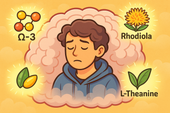
Brain Fog and Body Dysmorphic Disorder: Can Nootropic Supplements Help?
Brain fog often accompanies Body Dysmorphic Disorder, clouding focus and deepening emotional fatigue. Nootropic supplements like L-theanine, Rhodiola, and CoQ10 can help restore mental clarity, balance neurotransmitters, and bring calm energy back to the mind 🌿🧠.
-

How Stress Hormones Like Cortisol May Worsen Body Dysmorphic Disorder
Chronic stress floods the brain with cortisol — the hormone that keeps you on high alert. In Body Dysmorphic Disorder, this chemical overdrive fuels anxiety, distorts self-image, and traps the body in survival mode. Calming cortisol helps restore both peace and perspective 🌿🧠.
-

The Role of Neurotransmitters in BDD—and How Supplements May Help
Neurotransmitters like serotonin, dopamine, glutamate, and GABA shape how people with Body Dysmorphic Disorder perceive themselves. When these brain messengers fall out of balance, perception distorts — but targeted supplements can help restore calm, focus, and emotional regulation 🧠🌿.
-

What Is Body Dysmorphic Disorder? A Deeper Look at the Mind-Body Connection
Body Dysmorphic Disorder (BDD) isn’t just about appearance — it’s about perception. When brain chemistry, trauma, and stress distort self-image, the mind begins to see flaws that aren’t truly there. Healing starts by calming the nervous system and reconnecting mind and body 🪞🧠.
-
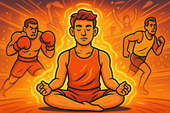
Keeping Calm in Competitive Sports: How to Train Your Mind, Body, and Chemistry for Peak Performance
Competitive pressure can overwhelm even the strongest athletes — but calm is trainable. By combining supplements like magnesium, L-theanine, and adaptogens with breathwork and mindset training, you can stay focused, balanced, and in control under any level of stress 🧠🏅.
-
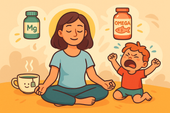
Supplements for Parents Facing Toddler Tantrums: Staying Calm When Little Emotions Run Wild
Toddler tantrums can drain even the most loving parent — but your calm is powerful. With the right supplements like magnesium, L-theanine, and ashwagandha supporting your nervous system, you can stay patient, grounded, and kind, even when emotions run high 🧸🌿.
-

Workplace Stress and Anger Management Support
Workplace stress can quickly turn into frustration — but calm is a skill you can train. By combining supplements like magnesium, L-theanine, and adaptogens with breathwork and mindset tools, you can stay focused, patient, and emotionally grounded no matter how intense the office gets 💼🌿.
-

How to Stay Patient With Family During Stressful Holidays
Holiday gatherings can stir up old stress and test your patience — but calm is possible. With nervous system support from magnesium, L-theanine, and adaptogens, plus mindful breathing and clear boundaries, you can stay centered, kind, and grounded even when family chaos unfolds 🎄💞.
-

Supplements to Keep Calm During Traffic Jams
Getting stuck in traffic doesn’t have to ruin your mood. With calming supplements like magnesium, L-theanine, and ashwagandha, you can train your body to stay relaxed and focused behind the wheel — turning gridlock into a moment of grounded patience 🚗🌿.
-
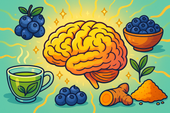
The Role of Antioxidants in Healing Brain Stress from Dissociation
Antioxidants protect the brain from the oxidative stress caused by trauma and dissociation. By neutralizing free radicals and supporting mitochondrial recovery, they help restore clarity, focus, and emotional balance — allowing the mind to heal at the cellular level 🌿🧠.
-
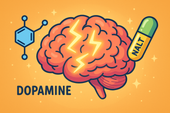
N-Acetyl L-Tyrosine (NALT) for Supporting Mental Clarity
N-Acetyl L-Tyrosine (NALT) fuels dopamine production — the neurotransmitter of focus and motivation. By supporting brain chemistry during stress, NALT helps restore mental clarity, energy, and alertness, making it easier to think clearly and feel present again ⚡🧠.
-

How Ginseng May Improve Focus and Energy in Dissociation
Ginseng helps combat the mental fatigue and fog that often come with dissociation. By supporting mitochondrial energy, balancing neurotransmitters, and regulating cortisol, it gently restores focus, motivation, and emotional presence — helping the mind reconnect with clarity and strength 🌿⚡.
-
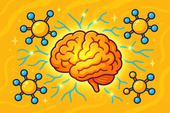
Phosphatidylserine and Dissociation: Supporting Cognitive Function
Phosphatidylserine helps calm the stress response by balancing cortisol, the body’s primary stress hormone. By lowering cortisol spikes, it protects memory, focus, and emotional stability — restoring clarity and mental presence for those struggling with dissociation 🧠🌿.
-
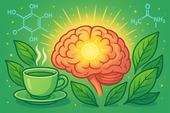
Can Green Tea Extract Help with Dissociative Brain Fog?
Green tea extract may help lift dissociative brain fog by supporting neurotransmitter balance, reducing inflammation, and enhancing energy at the cellular level. With its key compounds EGCG and L-theanine, it promotes calm focus, clarity, and emotional presence — helping you feel more alert and grounded 🍵🧠.
-
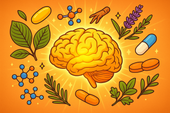
Building a Natural Supplement Stack for Dissociation Support
Building a supplement stack for dissociation means nourishing the brain and body back into communication. By supporting neurotransmitters, gut health, and energy balance through nutrients like magnesium, omega-3s, curcumin, and probiotics, you can help restore clarity, calm, and connection — one layer at a time 🌿🧠.
-

Chamomile and Lavender for Dissociative Anxiety Relief
Chamomile and lavender work together to calm dissociative anxiety by soothing the nervous system and restoring emotional safety. Their natural compounds balance cortisol, enhance GABA activity, and activate the vagus nerve — helping you feel grounded, connected, and at peace again 🌿💜.
-
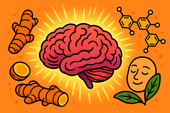
Curcumin for Inflammation and Mental Clarity in Dissociation
Curcumin, the golden compound in turmeric, does more than fight inflammation — it helps clear the mental fog often tied to dissociation. By calming neuroinflammation, balancing neurotransmitters, and supporting mitochondrial energy, curcumin can restore mental clarity, focus, and emotional presence 🌿🧠.
-
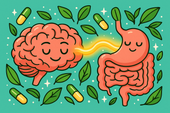
Probiotics and Dissociation: Exploring the Gut–Brain Axis
The gut–brain axis plays a vital role in emotional awareness and presence. When the microbiome is balanced, it supports serotonin production, vagus nerve activity, and calm focus. Probiotics help repair this connection — restoring safety, clarity, and the feeling of truly being in your body again 🌿🧠.
-
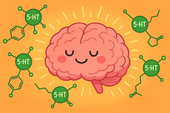
5-HTP for Dissociation: Supporting Serotonin and Emotional Stability
5-HTP helps bridge the gap between emotional numbness and stability by supporting serotonin production — the neurotransmitter that shapes mood, sleep, and sensory awareness. For people experiencing dissociation, 5-HTP may gently restore connection, presence, and emotional balance from the inside out 🌿🧠.
-
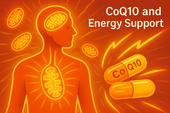
CoQ10 and Energy Support for People with Dissociation
Chronic dissociation often leaves the body running on empty — tired, foggy, and disconnected. CoQ10 helps recharge that system at the cellular level by restoring mitochondrial energy, reducing oxidative stress, and supporting the brain’s capacity to stay present. It’s energy medicine for both body and mind ⚡🧠.

















































